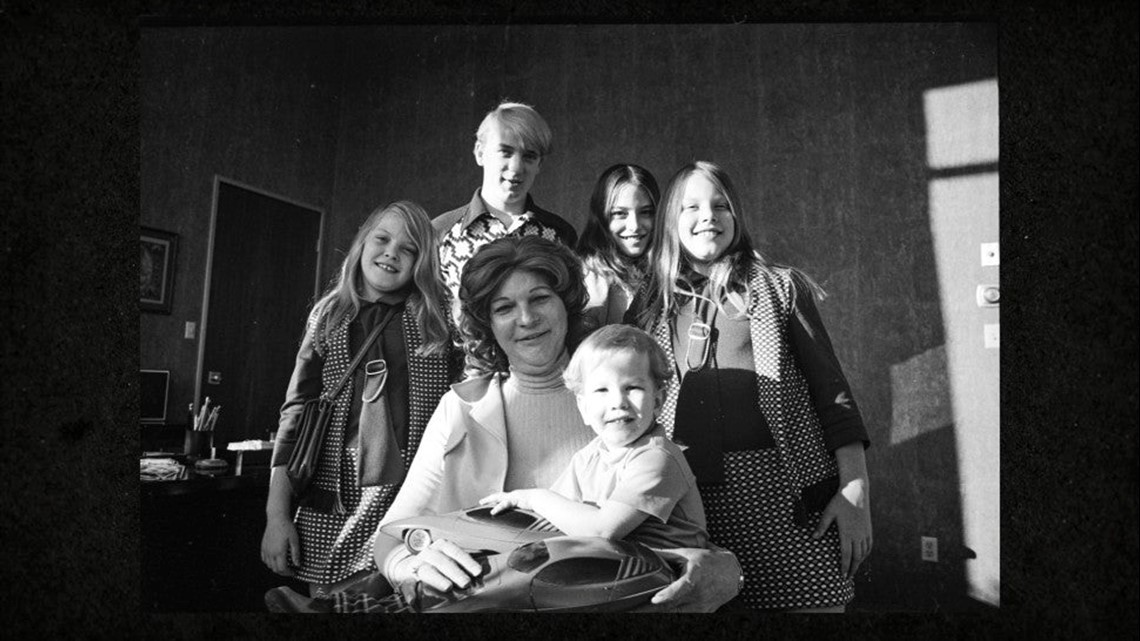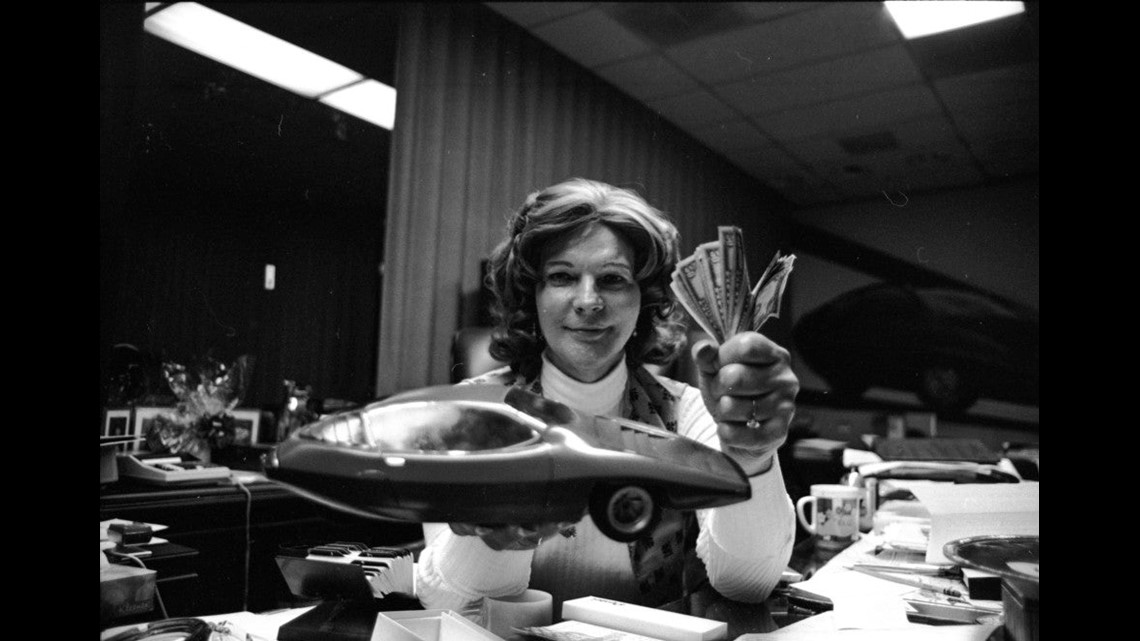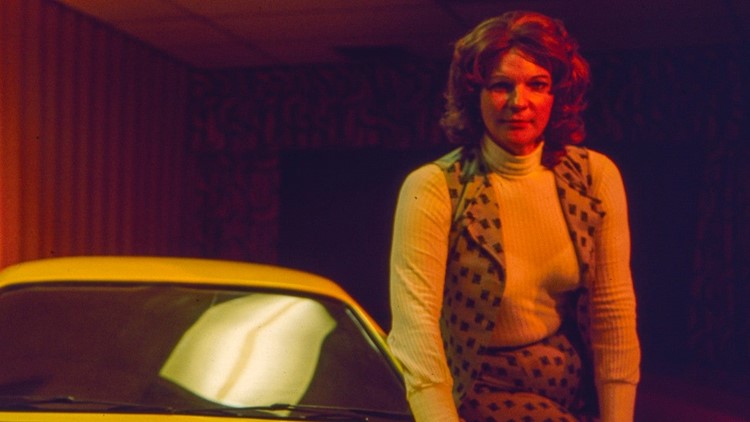Elizabeth Carmichael is many things to many people: a loving parent, a pioneer, an ambitious automobile entrepreneur, a criminal mastermind, or a fraud. In some instances, she was all at once. And that’s why she’s the subject of HBO’s four-part, visually stunning docuseries, The Lady and the Dale, co-directed by Zackary Drucker and co-executive produced by Jay Duplass, who opened up to ET about telling her story decades after she became a media sensation and the target of unwanted attention over her transgender identity.
“In many ways, this story has been lost to the annals of time,” Drucker says of Carmichael’s life and brief career as an entrepreneur who wanted to revolutionize the auto industry with a fuel-efficient, three-wheeled car known as the Dale. “This story was a tremendous discovery, I think, for all of us.”
“It’s very rare,” Duplass adds, acknowledging that many documentary subjects, especially ones that bleed over into the true-crime genre, typically have some sort of storied past documented on the internet. Whereas this is one story audiences won’t find conveniently summarized in a Wikipedia article or previously covered in some splashy Vanity Fair article at the time.
Even when co-director Nick Cammilleri first brought this story to the Duplass brothers after years of working on putting it together, Jay had never heard of it. “It almost just felt like, ‘Is this even real?’” he recalls. “There were so many elements to it, you know, Liz’s life as a con woman, Liz’s trans-ness, the Dale car that you couldn’t tell if it was real or not.”
But as the docuseries shows, the life and times of Elizabeth Carmichael are as real as they can get.
Before being associated with the Dale, Carmichael lived a storied past that included a history of various short-lived business ventures and small crimes. Like an alternate version of Catch Me If You Can, which is also based on a real-life story of crime, she counterfeited checks and ran get-rich-quick schemes out of people’s homes. Despite a collection of children and ex-wives, Carmichael lived life on the run from authorities, including a purported run-in with the mob. She even claimed to have smuggled arms to Cuba during the revolution.


By the 1970s, after she started to transition and began identifying as her true self, Carmichael became fascinated with a three-wheeled vehicle dubbed the Dale and sought out to revolutionize the automobile industry, which was facing down the Middle East oil crisis. She eventually founded the 20th Century Motor Car Company and quickly became a media sensation thanks to the promise that the Dale, with its high gas mileage and low price tag, would be bigger than the Model T. “The intention was clearly a positive intention to create relief in the midst of a gas crisis and to try and revolutionize the automobile and the energy sectors,” Duplass says.
Much like Elizabeth Holmes, the convicted founder of Theranos and the subject of the HBO doc The Inventor, the expectations and anticipation for the Dale soon exceeded any reality. “Obviously Liz came from a wildly different background,” Duplass says of Carmichael, who did nothing to stop it and engaged in dubious business practices to keep the company afloat as they tried to develop a functioning and replicable vehicle that investors had dumped millions of dollars into without even seeing it hit the road.
Eventually that attention led to questions about the company and its promises, with local news media and the FBI investigating Carmichael and 20th Century Motor Car Company from all ends. She was ultimately arrested for fraud and business code violations before a tested and approved model of the Dale was ever produced.
The trial that followed turned Carmichael into a media sensation as the public became both fascinated with the story behind the Dale and her transgender identity, which was constantly used against her as a method to perpetuate fraud. “Her self identifying as Liz and as a woman in court was this huge leap of progress,” Drucker says of her standing up for herself at the time and even getting the judge to rule that she was in fact a woman.
After pocketing millions and getting a local news channel to post her bail, Carmichael eventually fled and lived life as a fugitive. She spent nearly a decade in a small Texas town with her family before an episode of Unsolved Mysteries exposed her identity once again. After that, she was arrested and sent to prison on various charges including conspiracy and grand theft.
Of course, to say that’s all there is to the story is short-sighted. “It can’t be overstated like the amounts of twists and turns that we have in the documentary series,” Duplass teases. And indeed, there are too many to even dutifully summarize here.


But given this docuseries is also about transgender identity and the challenges faced by the community, when it comes to being perceived as deviants, frauds or criminals, it’s hard not to think of Carmichael as some sort of pioneer or folk hero. “We’re not positing that Liz is an appropriate role model in the series,” says Duplass, who is quick to point out and appreciate “her gumption to express herself, to survive, to achieve the American dream.”
“There’s elements of her story, her resilience and tenacity, in and of itself, that is heroic,” Drucker adds. “The thing that inspires me about her story is the flaws. I think that’s what makes characters relatable, whether it’s a scripted or unscripted narrative, and I hope that represents a new era of trans storytelling, where we don’t have to be just heroes. We don’t have to be a monolith of, like, the archetype who did everything correctly. I think there’s much more room for expansion and stories in which we’re able to be flawed.”
The Lady and the Dale premieres with back-to-back episodes on Sunday, Jan. 31 at 9 p.m. ET/PT on HBO and will be available to stream on HBO Max.
RELATED CONTENT:



